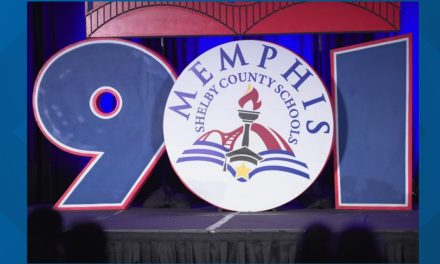Nothing is more frustrating than trying to be reasonable with unreasonable people or trying to be logical with illogical people.
It’s tempting to apply this principle to the town mayors, but when it comes to schools, they are more like petulant children determined to ignore the grown-ups in the room.
We’re going to hold our breaths until we get our way.
That was the tone of the mayors when they met with the schools planning committee generally, particularly two adults the mayors should listen to, Shelby County Mayor Mark Luttrell and FedEx Corp. general counsel Chris Richards.
Neither are anti-suburban people so their concerns and interest can’t be questioned as more talk from pro-Memphis liberals. And yet, their concerns and advice were dismissed just as cavalierly as obstacles to the town districts were swatted away by the consultant hired by the mayors to drive the facts and town school districts to a foregone conclusion.
Memphis Daily News reported that Mayor Luttrell asked: “Is the problem so compelling that you have to hit that September 2013 deadline? Is that something that could be delayed for a year?” Luttrell was also one of many questioning the conclusions of reports from Southern Educational Strategieson which five of the six suburban cities are basing their plans – including how to pay for the school systems.
“I just don’t think you can do it on a half-cent sales tax or a 15-cent property tax hike,” Luttrell said of the SES funding estimates. “That really troubles me.”
We can’t hear you. We can talk louder than you can.
Ms. Richards was even more critical. She said the municipal school districts’ plans based on the consulting firm reports are “fundamentally flawed. They fail to address the most important part of this law. … What’s a municipal school district? … A municipal school district in its plain meaning serves the children who live in the municipality. I don’t see how a federal district court judge – which I’m sure is where this is all going to end up – can interpret the words ‘new municipal school district’ to include what you’re proposing.”
“The people who do not live in Arlington are counting on representations that have been made that they will be able to keep their children in Arlington schools,” she said. “The way I look at it, there is one group sitting in this room that has clear legal authority to set forth a plan that will allow the expectations of all of those parents to be met. And that’s the transition planning commission.”
Then, there was Planning Committee Chair Barbara Prescott, highly respected civic leader and former Memphis City Schools Board member, who calmly suggested that the towns should take the reasonable approach: wait to see what the committee’s recommendations are before rushing to judgment. “Come August 2013, we will have a plan that can serve your children and serve them well,” she said.
We’re not listening. We want what we want.
Planning Commission member and former Shelby County Commissioner from Collierville Tommy Hart said: “I feel you are disenfranchising your citizens. Until we put a plan on the table, what are they (town residents) voting between? They are not making a choice. They are just affirming what people in the community have talked about.”
The mayors’ terse response: the train has left the station. The fact that it could jump the track any minute – over the price the towns should pay for school buildings and whether municipal districts are entitled to county funding – are mere minor points for them. They are engineers of the Cannonball Express.
The town mayors have said smaller districts are better. The Transition Planning Committee is poised to propose six largely autonomous districts that would be smaller in size than Shelby County Schools (and none of the town mayors seemed to have their present obsession with smaller size when they were part of that 50,000 student district).
Don’t say that. You can’t make me.
All in all, behavior aside, the mayor’s attitude toward public education merely institutionalizes an enmity toward all things Memphis which will provoke a similar hard-nosed response from Memphians over the long term as Memphis interests dominate policies of county government. Just as every action provokes an opposite and equal reaction, it will in the case of schools, but the opposite reaction will set a course that in the end will marginalize the towns in the affairs of our community.
In other words, in their haste to show their disdain for Memphis, they will set in motion a current that will in the end sweep in the nightmare they fear most: a city government that swells to control 500 square miles of Shelby County and be the single dominant and dominating government in the region as Shelby County Government’s influence dwindles.
Here’s the main thing: if the towns are willing to raise their taxes by at least 15 cents – likely much more in the coming years as we and Mayor Luttrell suspect – they should no longer be subsidized in any way from Shelby County Government.
For example, county taxpayers – of whom Memphians are the majority – should not subsidize towns like Arlington and Lakeland. Arlington keeps its taxes low by not having a police department. There, law enforcement is provided by the Shelby County Sheriff’s Department. Lakeland has never been a “real” city with property taxes, and county taxpayers have been subsidizing its law enforcement and fire protection.
Paying Their Way
Residents of Germantown and Collierville clearly must have enough money to start their own ambulance services so that they don’t need a partnership with county government whose calculations about how much the towns owe has been suspect. Meanwhile, no town receives more services and help from county government than Millington.
And if the towns have enough money to jack up taxes to protect their school turf, Memphians would have no objections at all if they would like to repay the costs of decades of subsidies by county government. After all, there was a time in the not too distance past when county government paid for the total cost – and later a percentage of the costs – of major roads inside the towns (it didn’t make a similar offer to Memphis). For decades, Memphians subsidized the towns’ libraries through their county property taxes which paid the total cost of libraries in the towns, both operations and capital costs.
Well, you get the point. If the towns now want the schools within its borders, the Planning Commission should discount it by the percentage of the total county tax base that is paid by residents of that town, thereby, arriving at the final price.
Meanwhile, the town mayors continue to say that there only concern is about the academic achievement of the children within their borders, but notably, there has been no study about how to improve student performance. There’s only been one to justify what the mayors already believed.
One of the hallmarks of childish behaviors is magical thinking, and nothing defines the town mayors’ point of view more than that these days.






There is only one thing wrong with the arguments presented in the article above: It makes sense. Actually, two things wrong: It’s based on rational thinking. Well, three things wrong: It looks at the overall picture, and departs from the tribalistic thinking that is so dominant in the greater Memphis community.
When thoughtful presentations like those made by Mayor Lutrell, Ms. Richards, and Ms. Prescott are dismissed casually as they were, one has the sense that the mayors are more interested in their own vested interests and ideologies than the common good of each community, not to mention the common good of all the residents of Shelby County.
An excellent blog…once again.
Great post and so true. Sometimes the best thing you can do for people like this is to give them what they want. Let them enjoy double taxes and higher taxes for a while.
Anonymous 2:34,
The problem I have with giving them what they want is that they will want the rest of us to pay for it when it doesn’t work out for them as they believe it will.
The town mayors are doing what the people that live in their towns want them to do! Simple as that!
The biggest problem with this article is that you forget that MCS did what they wanted regardless of the consequences to the 150k + children this would affect. They acted like petulant children determined to “hold their breath” until they got what they wanted. Being the 16th largest school district in the country won’t serve any child. The city government and school board have proven time and time again that they can’t manage what they have. The way the federal judge has set things, the city will have a majority on the board. This means the county has no real representation on the new board. To tell us we have to do what you( Memphians) want and tell us that we are unreasonable for doing what we want is absurd and hypocritical. To me it is odd that the individual cities don’t have their own school district. In the county in OH where we are originally from there are 36 different districts run by suburbs. In Shelby Co. we will have only 1. That’s just silly. You cannot meet the needs of each child. SCS hasn’t met the needs of their students, making one big district is a colossal mistake. I will not apologize for wanting better for my child and if that means I will pay more in taxes…it’s worth every penny.
There is a reason people have a bad opinion of Memphis, it’s the corruption and mismanagement that permeates every department and governing body in the city. If the citizens want to change that opinion then they need to cast their vote for better candidates. Memphis can be a great city again, if the citizens take back control.
Anon 10:34-
You are not going to win over many undecided opinions with generalizations like “The city government and school board have proven time and time again that they can’t manage what they have”. SCM has already proven the falacy of that statement when comparing cost of services and sevice levels withn the city and surrounding subruban areas.
“The way the federal judge has set things, the city will have a majority on the board. This means the county has no real representation on the new board”.
Actually, the county will have its share of elected representatives on the school board. So yes, areas outside the city will have very real representation on the new board.
Seeing as you disagree with everyone having equal representation based on population, how would you propose structuring representation?
Anon: We agree that all parents want the best education for their children, but how can you make that decision based on the fact that no such studies showing that have been undertaken. It’s about driving anti-Memphis sentiment to a destination with no serious research being done. Urbanut summed up the mismanagement issue, but as for the poor elected representatives put in office by Memphians, are you really saying that the county commissioners, state legislators, etc., elected by the suburbs are better. The suburbs have no room to lecture Memphis on quality public leadership.
Urbanut: it’s not a generalization. I just didn’t list them , so here’s a few. Let’s start small..the animal shelter has been mismanaged to the detriment of animals and now Mayor Wharton wants to put the woman who was in charge of it, in a position where she would oversee several departments. That is just plain stupid. The mayor created over 100 new positions at high salary levels and then gives employees a pay cut. Then we have Barbara Swearengen Ware using her position on council to get something for free. and how is she punished? Council accepts her resignation knowing she will plead guilty, and she keeps her pension. Back to the mayor…how do you find $5 million? Either you are lying to everyone about the state of city finances or you can’t manage money properly. These are all more recent so let’s go back a few years. The former mayor and council( some who are still on council) decided that they didn’t need to pay for city schools. Now there is a debt of $57 million dollars that the citizens of Memphis should have been paying. The citizens got an $0.18 property tax break for years that is now coming out of the pockets of hard working employees. I could go on but I think I’ve made my point. As for your comment about representation based on population. I absolutely agree with this. My problem is that I can vote for my mayor, city council, but not my entire school board. This is why school districts should be small. You have more control of you child’s education that way. This isn’t anti Memphis. I wouldn’t have moved 800 miles to be here if I was. But we live in the suburbs because of the crime and poor schools. And when our children are out of school we will move into one of those beautiful homes in midtown.
Smart City Memphis: I am not saying the County is better. I’m saying I have a say in who is elected in the county and don’t want my children’s future decided by some one else I didn’t have a say in! The county has it’s own problems, but combining the districts because of some perceived threat to MCS is ludicrous. I asked Tomeka Hart in person to explain to me how SCS becoming a special school district( the supposed inciting act) would negatively affect the children of MCS…..And I got nothing. No good reason at all. This is the same with the recent annexation issues. The manifest destiny attitude in the city needs to stop. While the city wants consolidation the rest of the county doesn’t.
The problem for city government is that with every reporter in the region covering them, every wart or problem is exposed. They go undetected in other governments, especially the smaller towns, but such is the nature of the news media these days. But that said, it shouldn’t make anyone feel cocky about the quality of their governments.
You have a say in who’s elected in the unified district, and more to the point, nothing will change. We’ve written before about the negative impacts of the county as a special school district before, so we won’t go into it again here, but there were numerous problems.
It looks to us that it’s the town who have the manifest destiny thing going for them – think about their own annexations – but invariably a different standard is always applied when it comes to Memphis. ;
Also, for a constituency that always want Memphis to be more efficient and economical, the multiple districts – like they were in Ohio – waste money, create duplication, and promote fragmentation.
Thanks for writing.